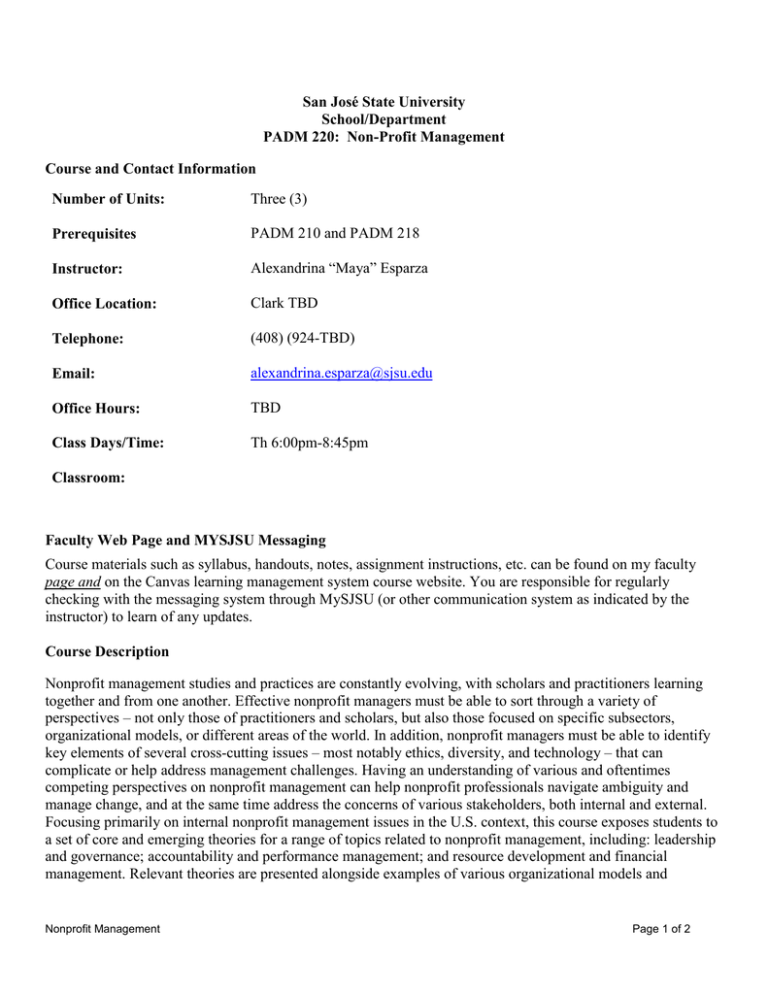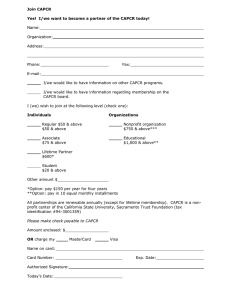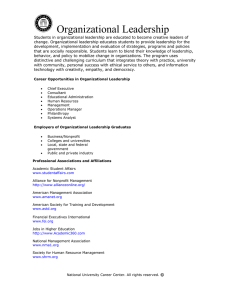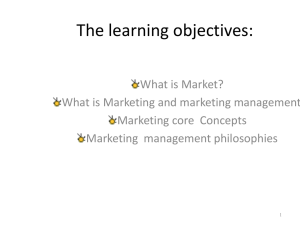Document 18011037
advertisement

San José State University School/Department PADM 220: Non-Profit Management Course and Contact Information Number of Units: Three (3) Prerequisites PADM 210 and PADM 218 Instructor: Alexandrina “Maya” Esparza Office Location: Clark TBD Telephone: (408) (924-TBD) Email: alexandrina.esparza@sjsu.edu Office Hours: TBD Class Days/Time: Th 6:00pm-8:45pm Classroom: Faculty Web Page and MYSJSU Messaging Course materials such as syllabus, handouts, notes, assignment instructions, etc. can be found on my faculty page and on the Canvas learning management system course website. You are responsible for regularly checking with the messaging system through MySJSU (or other communication system as indicated by the instructor) to learn of any updates. Course Description Nonprofit management studies and practices are constantly evolving, with scholars and practitioners learning together and from one another. Effective nonprofit managers must be able to sort through a variety of perspectives – not only those of practitioners and scholars, but also those focused on specific subsectors, organizational models, or different areas of the world. In addition, nonprofit managers must be able to identify key elements of several cross-cutting issues – most notably ethics, diversity, and technology – that can complicate or help address management challenges. Having an understanding of various and oftentimes competing perspectives on nonprofit management can help nonprofit professionals navigate ambiguity and manage change, and at the same time address the concerns of various stakeholders, both internal and external. Focusing primarily on internal nonprofit management issues in the U.S. context, this course exposes students to a set of core and emerging theories for a range of topics related to nonprofit management, including: leadership and governance; accountability and performance management; and resource development and financial management. Relevant theories are presented alongside examples of various organizational models and Nonprofit Management Page 1 of 2 management functions, and in light of current practitioner best practices, common pitfalls, and emerging trends in the sector. Learning Outcomes and Course Objectives Course Objectives 1. Introduce core and emerging theories and concepts as they relate to nonprofit management. 2. Expose students to best practices, common pitfalls, and emerging trends in nonprofit management. 3. Provide a foundation for understanding persistent and emerging issues in nonprofit management, from both scholarly and practitioner perspectives. 4. Provide a framework students can use to apply nonprofit management concepts and theories to case studies and real-life scenarios. 5. Provide students with a set of skills that enables them to assess the relative merits and applicability of various perspectives on nonprofit management. Student Learning Outcomes Upon successful completion of this course, students will be able to: 1. SLO 1. Demonstrate an understanding of a range of nonprofit management concepts and theories and their application 2. SLO 2. Analyze, synthesize, think critically, solve problems and make decisions by analyzing case analyses projects. 3. SLO 3. Demonstrate capacity to lead and manage in public governance by understanding nonprofit management challenges and best practices, including strategies for mitigating the impacts of challenges and implementing best practices. 4. SLO4. Communicate and interact with a diverse and changing workforce and citizenry through a series of homework assignments requiring responses to scholarly articles in the discipline, classroom participation, and the final paper that includes a more in-depth literature review and a short oral presentation. Textbook Worth, Michael J. 2014. Nonprofit Management: Principles and Practice. Third Edition. Thousand Oaks, CA: Sage Publications Collins, James C. 2001. Good to Great: Why Some Companies Make the Leap...And Others Don’t. New York, NY: HarperBusiness. Collins, James C. 2005. Good to Great and the Social Sectors: A Monograph to Accompany Good to Great. HarperBusiness. Other Readings Other readings are available on E-reserves in the library Nonprofit Management Page 2 of 2



